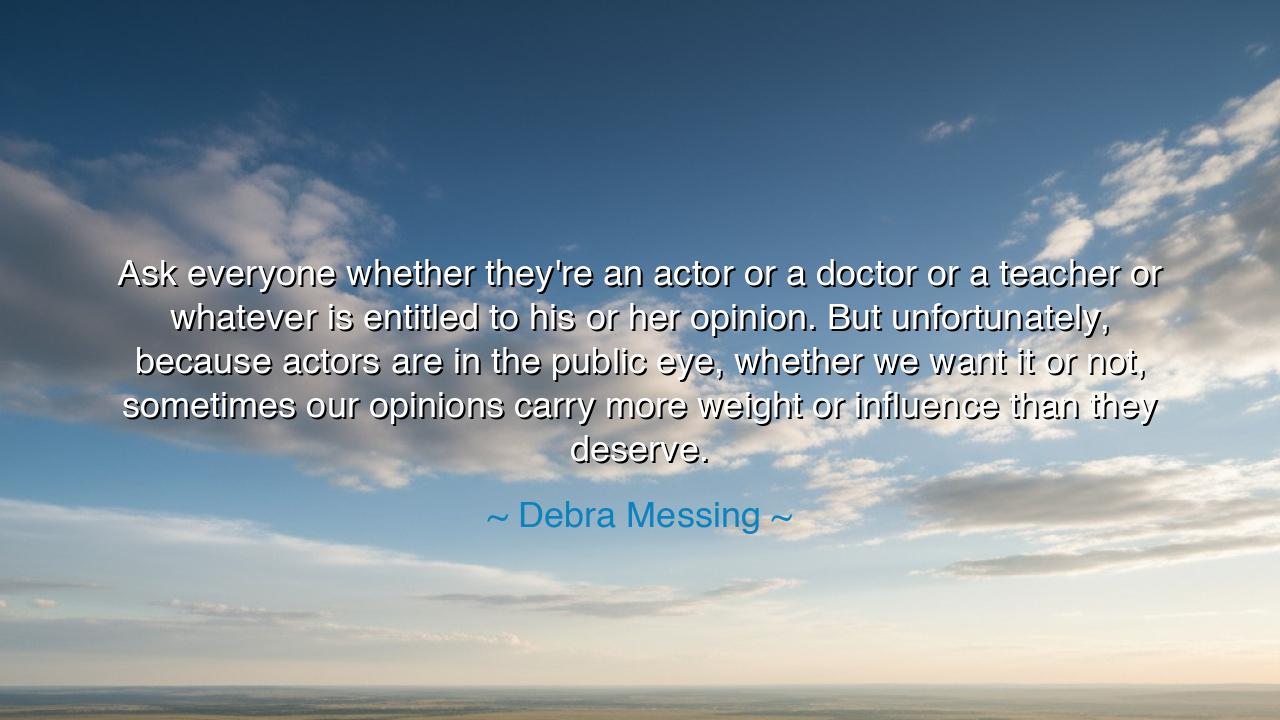
Ask everyone whether they're an actor or a doctor or a teacher
Ask everyone whether they're an actor or a doctor or a teacher or whatever is entitled to his or her opinion. But unfortunately, because actors are in the public eye, whether we want it or not, sometimes our opinions carry more weight or influence than they deserve.






“Ask everyone whether they're an actor or a doctor or a teacher or whatever is entitled to his or her opinion. But unfortunately, because actors are in the public eye, whether we want it or not, sometimes our opinions carry more weight or influence than they deserve.” Thus spoke Debra Messing, the actress known for her wit and candor, yet here unveiling a truth not only about her profession, but about the nature of fame and influence itself. In these words lies humility, caution, and wisdom—the recognition that the voices which echo loudest in the halls of culture are not always those most rooted in knowledge or truth.
The meaning is at once simple and profound. All men and women—whether actor, doctor, or teacher—possess the right to their opinion, for the dignity of thought is a universal inheritance. Yet Messing warns that not all opinions carry equal weight. Some voices are amplified not by merit, but by visibility. The actor, adored on screen, may be heard above the teacher, though the latter’s wisdom is deeper. The celebrity, seen by millions, may overshadow the quiet doctor whose words carry the authority of lived expertise. Thus, the danger: that society mistakes prominence for truth, applause for wisdom.
History gives us countless mirrors of this imbalance. In ancient Rome, the voices of popular gladiators often stirred the crowds more than the voices of philosophers. While a man of letters might labor to shape reasoned discourse, the shout of a public figure could sway the mob. Likewise, in modern times, a film star’s casual remark may ripple across nations, while the words of a scholar, born of decades of study, remain unheard. Messing, with honesty, admits that her own profession is bound to this imbalance: the world listens too closely, sometimes beyond reason.
Yet her humility is itself an antidote. By acknowledging that the opinions of actors may carry more influence than they deserve, she calls upon her fellow artists, and indeed all who wield public platforms, to act with responsibility. Influence is a fire: it can warm, enlighten, and inspire, or it can burn, mislead, and destroy. To speak without knowledge, while standing upon the stage of fame, is to risk misleading many. To speak with wisdom, however, is to transform celebrity into service.
Consider the story of Albert Schweitzer, physician, philosopher, and musician. Though celebrated widely for his music, he chose to lend his influence not merely to art, but to the service of humanity, healing the sick in Africa. Here is the model of balance: one who understood that influence is not to be squandered on vanity, but directed toward truth and compassion. Messing’s words echo this ancient wisdom—fame itself is neutral; it is the use of influence that gives it value.
The lesson for us is twofold. First, we must learn discernment. Do not accept the voice of the visible simply because it is loud. Weigh words not by the fame of the speaker, but by the truth they carry. Second, if you yourself hold influence—whether over a few or over many—guard it with humility. Speak when you know, listen when you do not, and use your platform, however small, for the good of others rather than the praise of yourself.
Therefore, dear listener, let Debra Messing’s words remind you of the sacred responsibility of influence. Do not envy those in the spotlight, for the glare of fame distorts as much as it reveals. And if you find yourself upon a stage, whether before a classroom, a workplace, or even a family, wield your voice with reverence. For every word you utter may shape more than you know. True greatness lies not in being heard by many, but in speaking what is worth hearing. And in that spirit, let us be cautious, humble, and wise, ensuring that the influence of our words is not more than they deserve, but precisely what truth demands.






AAdministratorAdministrator
Welcome, honored guests. Please leave a comment, we will respond soon